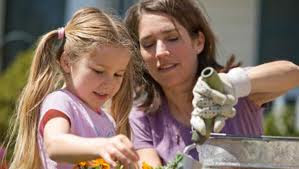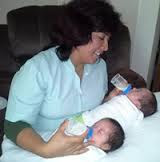COLLEGE EDUCATED NANNIES – A NEW TREND?

More than ever, families are wanting a nanny who can give their child an edge in an increasingly competitive world. Working Moms want to trust that their children are getting personalized attention and the best possible preparation for academic and social success. They want the education, but also the nanny experience, and the more degrees the better.
When the Great Recession hit, we got calls from college grads wanting nanny jobs. But if they didn’t have the nanny experience, we couldn’t help them.
“There’s a world of difference in someone who has professional experience”, Jenny Riojas, our Family Placement counselor, tells us, “in someone who has worked in a private home for a couple of years. Nannying is different from any other childcare profession, in that you’re working independently without supervision most of the time, and there is just so much you just need to know that you can’t learn from a classroom or a board room.”
A college graduate who nannied and babysat through college, however, is in high demand.
What’s drawing college educated candidates into the profession?

Amy Farris, now a Junior at ASU, has one more year to get her BS degree in psychology and is planning to get her Masters’s in child counseling. She has an AA degree from PVCC in Early Childhood Development and Nutrition. She fell in love with child care with her first position, 30 hours per week as a Mother’s Helper (working side by side with an at-home Mom) with a six month old. She realized then that she wanted a career making a difference in children’s lives. Since she does online classes, she’s able to give her family flexible hours. Raised by a Doctor Dad and RN, stay at home Mom, Amy had a typical childhood in a small Texas town. Her Mom instilled a love for serving people and playing soccer throughout high school drilled in the value of hard work and goal setting.
Amy was hired by a doctor a year ago for her then 22 month old daughter and a baby on the way after interviewing several candidates and a one week working trial with Amy that the agency strongly recommends.

“For me”, Amy tells us, “nannying started out as a way to make money and turned into a passion and a way to impact children’s lives in a big way. I consider it far more than an occupation. “I’ve been told that I’m very patient, and I have so much fun playing with them and teaching them.”
We asked Amy how her education has helped her nanny career.
“I would say my education has helped immensely, for example, when the kids are going through a new phase or challenging me in a new way, my first thought is to research to find a physiological understanding of their behavior. With three to four years of nanny experience, Amy obviously loves being with children, playing, reading, singing, dancing or cooking with them, and sees herself as teacher, mentor, tutor and big sister. She brings a lesson plan for every day, with a weekly theme, color, letters, and integrates textures, music, lunch, crafts, and museum trips around the themes. She thoughtfully and intentionally gives babies lots of sensory activities. “Everything is new to them.”

During down time, Amy plans for the next weeks curriculum, reads child development books and articles, and helps out with light housekeeping, dishes, family laundry, kids bathrooms, bedrooms and play areas, and tidying up. In the past, she’s done dinner prep or complete family dinners as well as grocery shopping. Her current family has also hired a chef through Caring Nannies, so her culinary skills aren’t as needed.
Do degreed nannies earn more? In an annual survey conducted by the International NannyAssociation this year, nannies reported a median salary of $16 per hour. College educated nannies can receive salaries equal to entry level jobs in other careers for grads. It can save a family the cost of tutors who can charge $25 to $60 per hour. Parents today often want someone with as much education as they have.
Born in Venezuela, Lisbeth Mendoza-Ferger moved to the US at age five with her family of eight. Her Dad, a CPA, wanted a better education and life for them. He insisted on preserving the history and culture of their native country, so he gave them additional history and Spanish lessons after their regular homework was completed. As a result, Lisbeth speaks perfect English and perfect Spanish, and is a fascinating mix of Spanish, Norwegian, Scottish, German and Castilian Spanish.

Lisbeth returned to college for a BS in Business management later in her adult life and after 15 years in the medical field and 10 years in the insurance industry. She took a semester in early childhood development through PVCC, taught preschool and then started nannying. She’s raised her own children and volunteered in community children’s activities and her children’s extra curricular activities.
“Knowing that I’m partnering with the parents’, she explained to us, “and providing for the kids what no one else can, I find it rewarding to be ‘family’, ‘best friend’ and ‘care provider’. I’m organized, manage time well and love the kids intensely and they know how much I care for them.”
We placed Lisbeth one year ago with a family with a four year old, a three year old and a baby on the way. She keeps the parents involved by taking pictures throughout the day and sharing details each night.
We asked Lisbeth how her education has helped her in her day to day job. “My nursing experience and education has helped me with taking care of the children when sick, managing my time and financial obligations with the family expenses, buying groceries or kids clothes. I have to be a good steward of the finances they’ve entrusted me with.”
“When I was in school, being a nanny wasn’t in my plans. I dreamed of having my own business in a service industry. I love helping people. It wasn’t until I was laid off that I fell into what I enjoyed the most, playing and spending time with kids. My education has helped me in teaching the kids how to develop their minds, critical thinking skills and reinforcing what they learn in school as well as teach them the love of reading books to broaden their imaginations.
We asked Lisbeth if she saw herself as a career nanny.
“I do. I love the family I work for and they love me and appreciate my time, efforts and sharing my life experiences after raising my own kids and grandson. I find this career more rewarding than my two previous careers. Being a nanny has made me a better mother, grandmother, wife and most important, kept me young at heart and active.” Lisbeth normally does a lesson plan for every day, a theme for the week, colors, letters and combines this with textures, crafts, lunch and books they read.
But what really makes a great nanny? How important is education? Is this just a post-recession trend?
A doctor Mom with newborn twins called me six years ago asking for a nanny with a college degree and I sent Charlene, a seasoned nanny with 20 years experience and a high school diploma. Charlene has a warm loving demeanor, knowledge of children’s developmental ages, the ability to multitask and organize, and a wealth of knowledge about raising children. Charlene was hired on the spot and stayed for the next 5 years and is still part of their lives.

Caring Nannies places candidates who have just a high school diploma, but with years of experience. Being bi-lingual is always a plus. Caring Nannies gets requests for nannies who speak Spanish, French or Mandarin.
We asked Lisbeth’s family if they felt her education makes a difference in their family. Amanda, the Mom told us: “I don’t know if that has made a huge difference in our interaction and overall experience with Lis. I think most important is that she’s open to feedback and we collaborate on parenting techniques. It’s extremely important that we be on the same page…Lis reads parenting books and does research on items as they come up with the kids. I’m sure her college education helped her develop those good habits…but don’t think it necessary.” We also asked Amanda, “How would you weigh her experience raising her own children and her character and personality versus her degree?” Amanda remarked: “Her character qualities and fact that she has had her own children have made the biggest impact on our family and have led to the great relationship we share. Having gone through much of what we are going through…Lis often gives good advice and helps us not worry about the small stuff. She’s a great nanny!”
“We look at the whole person,” Ashley Zehring, our nanny recruiter tells us.”The most important qualities we need are experience, great references, creativity, a sweet personality, warmth and interaction, and great communication skills. We want nannies who are basically happy. Cheerful. Curious. Playful. Fun. Flexible. Interested. Patient. Nurturing. Someone who’s passionate about what they’re doing can teach a child far more than someone with a PhD, who isn’t excited about being with a child.”
Beth Weise

No Comments
You must be logged in to post a comment.